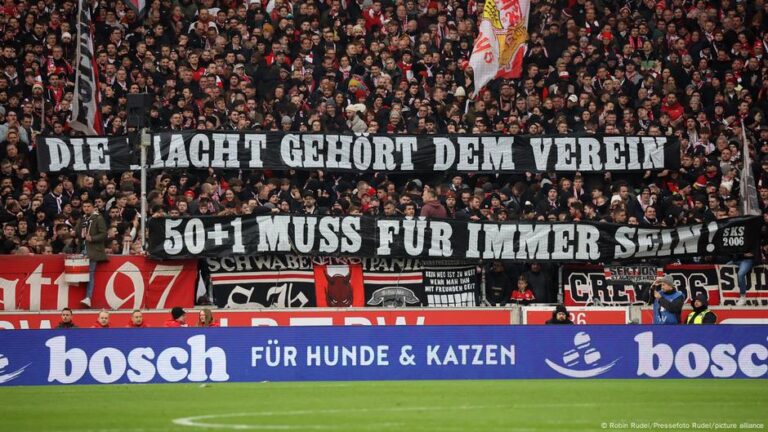What is the 50+1 rule?
The 50+1 rule is a central pillar of German professional football, which is intended to ensure that the club members retain control over the professional part of a football club.
The rule, in place since 1999, stipulates that the parent club, for example Bayern Munich, must hold at least 50% plus one vote in its spun-off professional football company — in this case, FC Bayern München Fußball AG.
This ensures that the majority of voting rights always lie with the club and its members.
Compliance with the rule in German professional football is primarily monitored by the German Football League (DFL). The DFL is the league association responsible for the organization and regulation of the Bundesliga and the second tier, Bundesliga 2.
The Federal Cartel Office, Germany’s central competition authority, also plays an important role. Since 2018, the office has been reviewing the 50+1 rule for possible competition law violations.
What is the purpose of the rule?
The rule prevents external investors from taking complete control of a club and managing it solely on financial grounds, potentially disregarding the interests of the fans.
50+1 also ensures a certain level of equality, as it is not possible for a club to invest disproportionately more money than other clubs thanks to its powerful investor with a controlling stake.
Fan culture, which is very strong in German soccer, is also a key component that is protected. Fans in Germany are not just paying spectators but active club members who can, for example, have a say in important club decisions at the annual general meeting.
The vast majority of organized fans in Germany oppose the commercialization of football. The 50+1 rule is therefore of great importance to them.
Are there exceptions to the rule?
A special rule allows investors to acquire a majority stake in a professional football division after 20 years of investment. Bundesliga clubs Bayer Leverkusen and VfL Wolfsburg are currently allowed to be controlled by companies, because they have received continuous and significant support from them for over 20 years.
Bayer 04 Leverkusen Fußball GmbH is wholly owned by the chemical company Bayer AG , and VfL Wolfsburg-Fußball GmbH is wholly owned by the Volkswagen Group.
Until 2023, the exemption also applied to TSG Hoffenheim, which was financially supported by patron Dietmar Hopp, one of the co-founders of the software company SAP. Hopp held the majority of the voting rights.
However, in June 2023, Hopp waived his majority rights and returned the voting rights to the parent club. This means that TSG is once again a normal 50+1 club.
RB Leipzig is a special case. Although the club formally adheres to the rule, it is criticized because it has only 23 voting members, most of whom have close ties to sponsor Red Bull. Critics therefore accuse the club of circumventing the rule without breaking it.
The Federal Cartel Office is currently calling for improvements and more open access to membership for Leipzig. With regard to Leverkusen and Wolfsburg, after checking recent changes to the sports antitrust law from the European Court of Justice (ECJ), they recommend amending the exemptions that apply to the pair.
Is there any criticism of the rule?
Critics argue that the 50+1 system puts German football clubs at a financial disadvantage compared to other countries. While teams in England, France or Saudi Arabia can access enormous sums of money thanks to their investors, the rule restricts German clubs’ raising of capital. Potential investors are discouraged because they invest (a lot of) money but do not gain control over the club in return.
Another point of criticism is that the rule can be circumvented in practice (RB Leipzig, for example), making it ineffective. Others who want more investor involvement generally see it as an obstacle to structural reforms in football and entrepreneurial flexibility.
Do fans from other countries also want a 50+1 rule?
Many fans from other countries would like to see a model like the 50+1 rule — especially in response to controversial investor takeovers and the growing influence of big investors and nation states.
Some voices were raised in England after the Saudi sovereign wealth fund PIF took over Premier League club Newcastle United in 2021 though not with the same conviction as fans in Germany.
The briefly mooted creation of a Super League in 2021, in which six English clubs originally wanted to participate, also fueled the discussions.
In France, criticism is growing of the dominance of investor-owned clubs like Paris Saint-Germain, which is controlled by the Qatari sovereign wealth fund. Nice, Olympique Lyon, Olympique Marseille, Monaco and Toulouse are also majority-owned by foreign investors.
Many fans want more say and a stronger connection between clubs and their membership base.
Meanwhile traditional Italian clubs like AC Milan and Inter have changed ownership several times in recent years, usually with little consideration for the interests of the fans.
Calls for regulations that limit the influence of investors and protect the identity of the clubs are therefore growing louder.
Real Madrid and Barcelona in Spain remain member-owned, but some smaller clubs are owned by foreign investors. Here, too, there are movements pushing for a return to a member-led structure.
And in Brazil, where the football market was only opened to investors in 2021, concerns about clubs losing their identity are growing.
Therefore, there are initiatives there, too, from fans as well as sports economists, lawyers and politicians, advocating for the introduction of legal protection mechanisms based on the German model.
This article was originally written in German.


